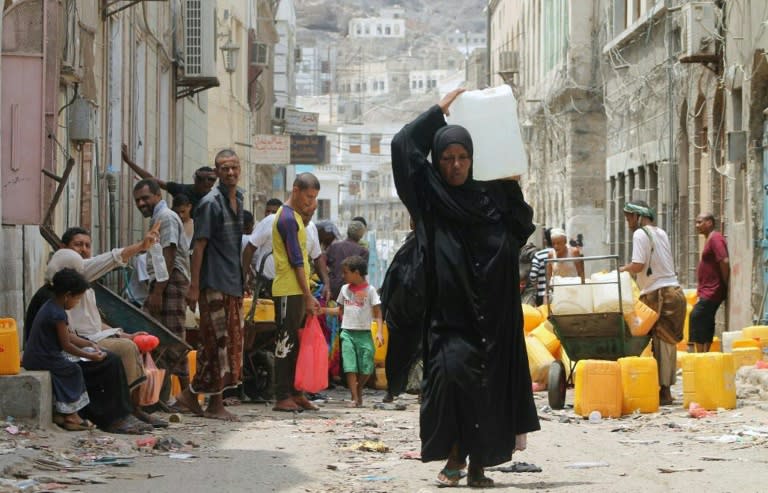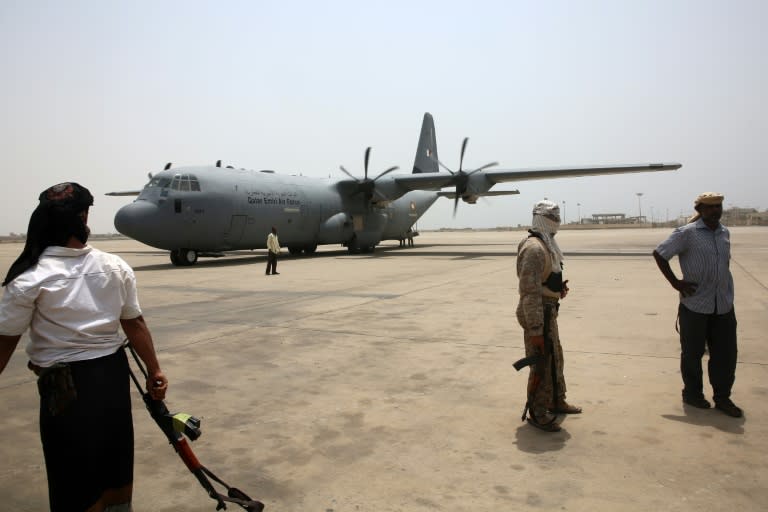Aid finally trickling in to Yemen's devastated Aden
After four months of heavy fighting, help has finally started to trickle in to Yemen's devastated city of Aden, but aid workers say it is not nearly enough. The conflict between Shiite Huthi rebels and pro-government forces has left up to 4,000 dead since March, 80 percent of the population in need of aid and more than 10 million people struggling to obtain food and water, according to the United Nations. After being retaken from the rebels in mid-July, the southern port city of Aden is deeply scarred, with gutted buildings, broken sewage pipes and a lack of water and electricity. As the city's streets start to be cleared of debris, locals are wandering out in search of basic supplies. Dragging plastic jerry cans, Abel Rahman Saleh is heading to a well in the central Crater neighbourhood in the hope of finding water. "We're living through a real disaster, without water, electricity or salaries," he told AFP, his voice barely audible, his face drawn. "I wasn't able to leave my neighbourhood (during the fighting) because I had nowhere else to go," he added. Awad Nasser, another Crater resident who sought shelter in the suburban Sheikh Othman neighbourhood during the fighting, returned home to find nothing but wasteland. "There's nothing left, absolutely nothing," he said, lamenting the lack of any public assistance. Yemen has been rocked by conflict since late March, when the Iran-backed rebels overran Aden, causing the country's internationally recognised President Abedrabbo Mansour Hadi to flee to Saudi Arabia. - A drop in the ocean - A Saudi-led military coalition launched air strikes against the rebels and their allies in support of Hadi's efforts to retake control of the country. Forces loyal to Hadi ousted Huthi rebels from the southern city last month, allowing much-needed relief supplies in to the city for the first time since the beginning of the conflict. The reopening of Aden airport on July 22 allowed emergency aid to be flown in from Saudi Arabia, the United Arab Emirates and Qatar, three members of the coalition. The Huthis' departure from Aden has also allowed aid in to the city from the sea. But the relief is but a drop in the ocean given the needs of the city's some one million residents, aid workers said. "The aid is not enough to meet the needs. It only serves to lessen the disaster we are living through," said Adnan al-Kaf, spokesman for a humanitarian association that on Sunday started distributing Saudi aid in the Sheikh Othman district, with up to 15,000 food packages to be handed out per day. Saudi Arabia on May 13 announced it would double its humanitarian aid to Yemen to about $540 million (490 million euros). But the United Nations on July 7 complained of having received only 13 percent of the $1.6 billion requested to assist Yemen's population. - Public services paralysed - Three ships chartered by the UN's World Food Programme have been able to unload 7,000 tons of humanitarian aid in Aden since July 21, said Nasser Bajanoub, head of the Society for Humanitarian Solidarity, a UN partner. "Two days ago, we started food distribution to 7,000 families and we intend to reach 26,000 families," he said. "We haven't encountered any particular difficulties for our operations in Aden, but we haven't managed to gain access to people in the other southern provinces," he said, blaming ongoing fighting. Forces loyal to Hadi continue to seek to advance north, with violent clashes against the Huthis trying to hang on to their positions. Several ministers may have returned to town and the head of Yemen's internationally recognised government, Khaled Bahah, briefly visited the city on Saturday, but public services remain paralysed. Bahah said that his symbolic visit was intended to confirm that "normal life" would return to a "liberated Aden". But Mohamed Mossaed, an activist involved in the aid effort, said that would be exceptionally difficult. "The authorities lack the resources to start rebuilding," he said. "Some have expressed surprise at the lack of any action from the authorities, but they don't even have cables to bring electricity back."






